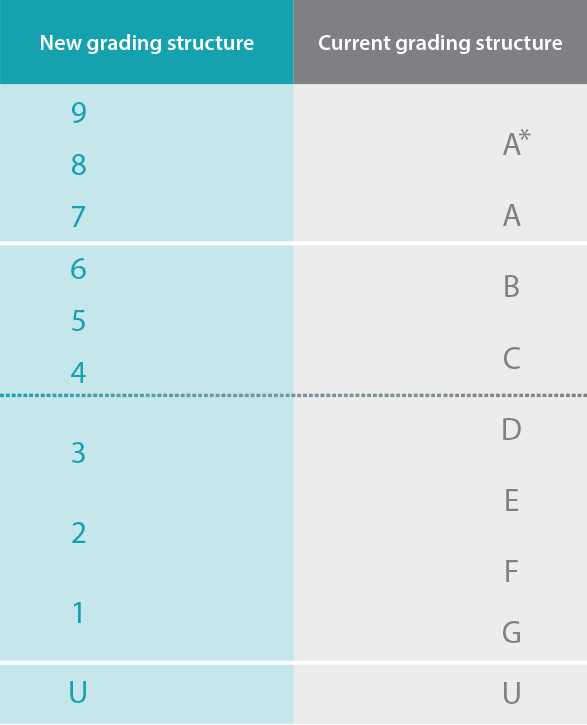GCSE results 2018: still on an upward trend
Millions of students across the UK have received their GCSE results today with outcomes remaining stable compared to previous years despite previous fears that the new reformed GCSEs would result in a dip in results.

GCSE highlights
- Standards have been maintained at key grades- 7(A), 4(C) and 1(G), the points at which comparisons between reformed and non-reformed GCSEs can be made
- The percentage of pupils achieving a 7 (A grade) has increased by 0.5 per cent on last year to 20.5 per cent.
- The percentage of pupils achieving a 4 (C grade) has increased by 0.5 per cent on last year to 66.9 per cent
- The percentage of pupils achieving a 1 (G grade) is down 0.1 per cent on last year to 98.3 per cent.
- There have been large increases of nearly 20 per cent in entries for separate sciences, outcomes of the new Double Science award were in line with expectations
- Within the subjects, there were entry increases in MFL, Geography and History with a notable increase of nearly 12 per cent of pupils choosing Computing.
What is the new GCSE grading system and why have GCSEs been reformed?
A wave of reforms to the GCSE system began in in 2015. It saw a return to a linear approach, with students sitting examinations at the end of the two–year course rather than being allowed to sit them at various points during the course.
Relocate Global's Guide to Education & Schools in the UK 2018 is packed with expert tips and information for those relocating and the professionals supporting them. Access your free digital copy here.
Pupils were also forced to study the full curriculum. Previously, they had been allowed to study a narrower part of the syllabus in some subjects, such as English literature and history.September 2015 saw sweeping changes to the curricula in English language, English literature and maths, including the introduction of more-demanding content.Pupils embarking on their GCSE studies that September received marks for English language, English literature and maths under a new grading scale of 9 to 1 in last years results, with 9 being the top grade. The numerical grades were designed by former Education Secretary Michael Gove partly to counter grade inflation at the top end, since A and A* are split between grades 7, 8 and 9.This year is the first year that the numerical grading has been awarded in 23 subjects.
Comparing old grades with the new
The following table is a comparison of the old grading system and the new numerical system. A grade 9 is a higher achievement than an A*. Of the 4.16 million entries across England only 732 pupils scored seven or more grade 9s, reflecting the exceptional standard of the new grade which is higher than an A*.A Department for Education spokesperson said, “We want all children to have a world class education, including those of the highest ability. Our new gold-standard GCSEs don’t just raise academic standards but the new grade 9 provides stretch at the top end of the ability range to recognise and reward truly exceptional performance.”But John Cope, CBI head of education and skills policy warned about the confusion for employers, “Today’s results will look very different this year, as more subjects transfer to the new grading system. It’s entirely understandable that if 8s and 9s are depicted as equivalent to last year’s A*s when they’re not, young people will experience unnecessary stress. “Employers need to be able to properly understand people’s CV’s, which could now include a series of numbers, letters, words like ‘merit’, ‘distinction’, ‘pass’, ‘fail’, UCAS points, and whatever the new T-Level grading system is.”Pupils in Wales and Northern Ireland are unaffected by the new grading system as their results have still been graded A*–G.
Of the 4.16 million entries across England only 732 pupils scored seven or more grade 9s, reflecting the exceptional standard of the new grade which is higher than an A*.A Department for Education spokesperson said, “We want all children to have a world class education, including those of the highest ability. Our new gold-standard GCSEs don’t just raise academic standards but the new grade 9 provides stretch at the top end of the ability range to recognise and reward truly exceptional performance.”But John Cope, CBI head of education and skills policy warned about the confusion for employers, “Today’s results will look very different this year, as more subjects transfer to the new grading system. It’s entirely understandable that if 8s and 9s are depicted as equivalent to last year’s A*s when they’re not, young people will experience unnecessary stress. “Employers need to be able to properly understand people’s CV’s, which could now include a series of numbers, letters, words like ‘merit’, ‘distinction’, ‘pass’, ‘fail’, UCAS points, and whatever the new T-Level grading system is.”Pupils in Wales and Northern Ireland are unaffected by the new grading system as their results have still been graded A*–G.Performance in STEM subjects
Girls generally continued to perform better than boys but concerns around their uptake of STEM subjects still abound.Jill Morris, Senior HR Business Partner UK&I at Hitachi Vantara said, “While early GCSE results show that girls continue to outperform boys across subjects, this is not the case for science and technology subjects and typically fewer choose to pursue careers in the field beyond secondary school."We must address this issue from a grass roots level, and more still needs to be done by government and education providers alike to promote STEM as a viable and attractive career option for both men and women.”IGCSEs
IGCSEs are no longer recognised in the UK government’s performance tables as they are now seen as easier than the new reformed GCSEs, although they remain popular with independent schools who largely chose them in the first place because they were seen as similar in style and rigour to the old O Levels, offering a more academically challenging option for the brightest pupils.How did top schools around the world do?
Check back for results from the schools as we will be adding them as they come in.The British School in the Netherlands
 61 per cent of students at The British School in the Netherlands received grades 9-7 (A*-A) compared to the UK average of 21 per cent. 96 per cent of all grades were 9-4 (A* - C). Paul Topping, Headteacher of Senior School Voorschoten, said, “Year 11 students have excelled in their GCSE outcomes and our school is proud to celebrate high levels of achievement in all subjects across the curriculum and in co-curricular activities such as the Duke of Edinburgh’s International Award."
61 per cent of students at The British School in the Netherlands received grades 9-7 (A*-A) compared to the UK average of 21 per cent. 96 per cent of all grades were 9-4 (A* - C). Paul Topping, Headteacher of Senior School Voorschoten, said, “Year 11 students have excelled in their GCSE outcomes and our school is proud to celebrate high levels of achievement in all subjects across the curriculum and in co-curricular activities such as the Duke of Edinburgh’s International Award."Haileybury, UK
Haileybury are celebrating their best results ever. 43 per cent of all grades awarded were at grades 8–9 (A*). This betters the previous School record by a significant margin of almost 10 per cent. 20 per cent of all grades awarded under the new 9-1 grading system were awarded at the top level, grade 9. This is particularly impressive against a national figure of just 5 per cent.St Lawrence College, UK
St Lawrence College has seen an increase in its top GCSE grades for the fourth year in a row, with 36 per cent of all grades the equivalent of A*-A and 65 per cent A*-B. Local pupils Zofia, Hugo and Hannah amassed 27 of the coveted Grade 8/9s between them, whilst boarding pupils Tobi and Amelia jointly managed an impressive 15 top grades. Results were notably strong in Science, and the school is shortly to formally open its new £6M Science, Art and Design Technology Centre.Kent College Canterbury, UK
At Kent College Canterbury, the overall pass rate was 100 per cent and 90 per cent of students achieved five GCSEs at 4-9 (the equivalent of A*-C). New records for the school included the number of students who achieved five good GCSEs including Maths and English and the very high percentage of top grades achieved. These statistics follow on from the excellent results at A level and IB already announced.Cognita Schools
Students from Cognita Schools offering the GCSE curriculum are celebrating, with an impressive 10 per cent of all grades awarded at the top level, grade 9. Cognita students also achieved double the national average of 7+ grades (equivalent to the former A grade and above) across all subjects, with an average 41 per cent of grades at 7+, compared to the national average of 20.5 per cent. Stuart Rolland, Cognita's Chief Executive Europe, said, "We are so proud that Cognita students continue to buck the national trend which shows a flat trajectory under the new grading structure."The British School of Brussels (BSB), Belgium
 61 per cent of all grades awarded at BSB were A*/A or 9-7 and the A*-C or 9-4 pass rate was 95 per cent – an increase of 3 per cent on last year despite more challenging content.
61 per cent of all grades awarded at BSB were A*/A or 9-7 and the A*-C or 9-4 pass rate was 95 per cent – an increase of 3 per cent on last year despite more challenging content. Bangkok Patana, Thailand
IGCSE results: At Bangkok Patana 83.1 per cent of all grades were awarded at A*-B. In addition, 61.5 per cent of all IGCSE grades achieved were at A*/A, a fantastic achievement for a non-academically selective school. GCSE results: This year is the first year that Art and PE were graded under the new 9-1 system. 36.4 per cent of grades in these two subjects were awarded at Grade 8/9 (the equivalent of A*). 36 per cent of students (54 students) achieved 8 or more A*/A.Tanglin Trust School, Singapore
Tanglin Trust School celebrated fantastic (I)GCSE results with 47 per cent of all grades at A* or equivalent numerical grade . More than three quarters (77 per cent) of all grades achieved were either A, A* or equivalent and 98 per cent of all grades achieved were A* to C or equivalent.The Alice Smith School, Malaysia
Students at The Alice Smith School excelled in both the old-style and new (I)GCSEs. 22 per cent of grades were awarded at level 9 and almost 50 per cent of students achieved eight or more A/A* (7-9) grades.Dulwich College
Students at Dulwich Colleges in Beijing, Seoul, Shanghai, Singapore and Suzhou as well as Dulwich International High Schools in Suzhou and Zhuhai undertook IGCSE exams. 65 per cent of all grades awarded across the network were A*/A and 96 per cent A*-C. Of these results, 77 per cent of students studying Mandarin achieved A*/A. For more education and school related news, visit our Education and Schools pages.Access hundreds of global services and suppliers in our Online Directory©2026 Re:locate magazine, published by Profile Locations, Spray Hill, Hastings Road, Lamberhurst, Kent TN3 8JB. All rights reserved. This publication (or any part thereof) may not be reproduced in any form without the prior written permission of Profile Locations. Profile Locations accepts no liability for the accuracy of the contents or any opinions expressed herein.




























